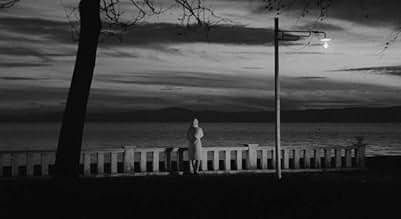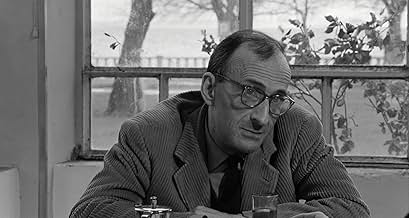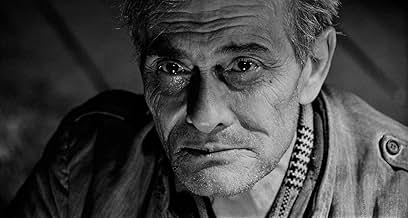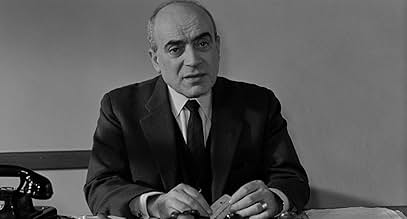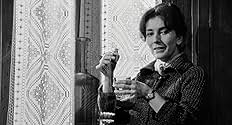ÉVALUATION IMDb
7,0/10
1,6 k
MA NOTE
Ajouter une intrigue dans votre langueWhile visiting his favorite resort town during the off-season, a novelist investigates the apparent suicide of a woman he was infatuated with.While visiting his favorite resort town during the off-season, a novelist investigates the apparent suicide of a woman he was infatuated with.While visiting his favorite resort town during the off-season, a novelist investigates the apparent suicide of a woman he was infatuated with.
Pia Lindström
- Adriana
- (as Pia Lindstrom)
Pier Giovanni Anchisi
- Francesco - Photographer
- (as Piero Anchisi)
Anna Maria Gherardi
- Servant Girl
- (as Anna Gherardi)
Jean Rougeul
- The Journalist
- (uncredited)
Histoire
Le saviez-vous
- ConnexionsReferenced in Il était une fois à... Hollywood (2019)
Commentaire en vedette
A young writer Bernardo (Peter Baldwin) decides to come back to a small town, set nearby a lake, where he had previously stayed and met a attractive maid and waitress – Tilde (Virna Lisi). The place is desolate then, as the action takes place in winter and the tourist are not particularly interested in this place at this part of the year. Bernardo is in search for peace and quiet and this is why he has an intention of having a rest there and working on his new book. However, after some time it dawns on him that, actually subconsciously, he wants to meet the beautiful waitress. He plans to rediscover her and starts searching, after which he is informed by the owner of the hotel about her mysterious death
This is often considered to be one of the earliest examples of giallo genre, along with Blood And Black Lace (1964). In spite of this fact, this cannot be considered, just like later effort by Bazzoni, masterful Footprints On The Moon (1975), to be a typical mystery that made a pattern for all films of this genre, as it differs drastically. In addition to this, the flick is more likely to remind Blow Up (1966) by Antonioni than The Bird With Cristal Plumage (1969) or Deep Red (1975) by Argento. The main character appears to be lost in the world of his own illusions and enquires himself what is real and what is just his imagination, just like David Hemmings in Antonioni's masterpiece. While Michelangelo Antonioni is more interested in general subject of perception and human identity in the world, in which being a witness is a very relative phenomenon, Bazzoni avoids such topics and focuses on delving into Bernardo's mind. Our protagonist himself is not a witness, he's just implicated in a twisted affair surrounding this town. To render psychological aspect even more visible and more articulate, the director utilizes a very slow pace and we can hear our character's thoughts. Owing to this, the viewer is able to follow all the vacillations of the main character and follow all possible ways of Tinde's demise accompanying this mystery envisioned by Bernardo. What is more, Bazzoni exploits black-and-white cinematography which makes things even more fascinating. To sum up, all these elements give it a very distinctive look and it is far from a simplistic murder mystery and the film becomes a sort of a psychological drama. At the end, nothing seems to be concluded and unraveled in detail. In spite of the fact that Bernardo's explanation is the most probable, there are plenty of additional subplots which suggest that many things remain obscure and inexplicable. Thanks to an exceptional editing, chilling sequences of dreams and flashbacks merged together, the ensemble looks terrific.
Therefore, nothing is certain in this flick. The whole plot is shown from the Bernardo's point of view, along with his visions and dreams. This render everything not only a murder mystery, but also a great psychoanalysis of the Bernardo's mentality, exposing all his fears, desires and his vague relationship with Tilde whose personality we get to know through his memory. Thus, this subjective nature and unusual perspective make it so extraordinary and riveting. The script itself isn't the biggest advantage of this picture. If it was made by somebody else, it would possibly be a flop. Fortunately, on account of tremendous direction by Bazzoni, his visual style, exquisite taste for creating adequate atmosphere of anticipation and ambiguity, The Possessed (1965) (La donna del lago) is a true gem.
The cast is nothing special, but all of the actors manage to achieve a satisfying level of acting artistry. Peter Baldwin, a little known television actor, gives a quite decent performance. There are a couple of familiar faces: such as Phillipe Leroy, known for his roles in Yankee (1966) by Tinto Brass, and Salvo Randone from Investigation of a Citizen Above Suspicion (1970) by Elio Petri. Their roles are rather a minor ones, as Peter Baldwin is the most important character and the action revolves around him.
Overall, La donna del lago (1965) might not be as visually striking as gorgeous Footprints On The Moon (1975), nonetheless it's a very impressive little movie that should be more known than actually it is. The story itself is nothing really new, but the way it is executed makes this one refreshing and worth a look. Luigi Bazzoni attaches a great importance to a psychological aspect of characters in the film and owing to this outshines many other flicks in its genre. Now, it remains only a hidden gem and sadly it seems there is no possibility to popularize it in the nearest future. Pity. This deserves to be more prevalent.
Therefore, nothing is certain in this flick. The whole plot is shown from the Bernardo's point of view, along with his visions and dreams. This render everything not only a murder mystery, but also a great psychoanalysis of the Bernardo's mentality, exposing all his fears, desires and his vague relationship with Tilde whose personality we get to know through his memory. Thus, this subjective nature and unusual perspective make it so extraordinary and riveting. The script itself isn't the biggest advantage of this picture. If it was made by somebody else, it would possibly be a flop. Fortunately, on account of tremendous direction by Bazzoni, his visual style, exquisite taste for creating adequate atmosphere of anticipation and ambiguity, The Possessed (1965) (La donna del lago) is a true gem.
The cast is nothing special, but all of the actors manage to achieve a satisfying level of acting artistry. Peter Baldwin, a little known television actor, gives a quite decent performance. There are a couple of familiar faces: such as Phillipe Leroy, known for his roles in Yankee (1966) by Tinto Brass, and Salvo Randone from Investigation of a Citizen Above Suspicion (1970) by Elio Petri. Their roles are rather a minor ones, as Peter Baldwin is the most important character and the action revolves around him.
Overall, La donna del lago (1965) might not be as visually striking as gorgeous Footprints On The Moon (1975), nonetheless it's a very impressive little movie that should be more known than actually it is. The story itself is nothing really new, but the way it is executed makes this one refreshing and worth a look. Luigi Bazzoni attaches a great importance to a psychological aspect of characters in the film and owing to this outshines many other flicks in its genre. Now, it remains only a hidden gem and sadly it seems there is no possibility to popularize it in the nearest future. Pity. This deserves to be more prevalent.
- m-sendey
- 15 févr. 2013
- Lien permanent
Meilleurs choix
Connectez-vous pour évaluer et surveiller les recommandations personnalisées
- How long is The Possessed?Propulsé par Alexa
Détails
- Date de sortie
- Pays d’origine
- Langue
- Aussi connu sous le nom de
- The Possessed
- Lieux de tournage
- Brunico, Bolzano, Trentino - Alto Adige, Italie(lakeside town: street views, shops, train station)
- sociétés de production
- Consultez plus de crédits d'entreprise sur IMDbPro
- Durée1 heure 25 minutes
- Couleur
- Mixage
- Rapport de forme
- 1.85 : 1
Contribuer à cette page
Suggérer une modification ou ajouter du contenu manquant

Lacune principale
By what name was La donna del lago (1965) officially released in Canada in English?
Répondre
